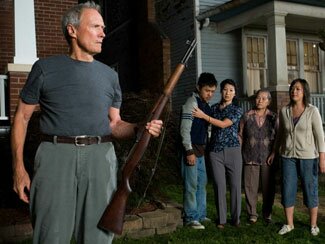MOVIE REVIEW- <i>Gran</i>'s grand: Eastwood is older and better
 This may turn into a love letter to Clint Eastwood, for which I apologize in advance. The guy is the personification of, "I'm not getting older, I'm getting better." At 78, he's still doing some of his best work, directing Changeling and Gran Torino back to back, starring in Gran Torino, composing the score for Changeling, and writing a song for Gran Torino, which he sings in a voice that rivals Pierce Brosnan's. (Thankfully, Jamie Cullum takes over after a verse or two.)
This may turn into a love letter to Clint Eastwood, for which I apologize in advance. The guy is the personification of, "I'm not getting older, I'm getting better." At 78, he's still doing some of his best work, directing Changeling and Gran Torino back to back, starring in Gran Torino, composing the score for Changeling, and writing a song for Gran Torino, which he sings in a voice that rivals Pierce Brosnan's. (Thankfully, Jamie Cullum takes over after a verse or two.)
Most directors half Eastwood's age would be proud to have either of those films to their credit, but both by one man in one season is just amazing.
Walt Kowalski (Eastwood) lives in Detroit; he's a retired Ford plant worker who may be the last white American in his neighborhood. He's introduced at his wife's funeral, giving his grandchildren a "You kids get off my lawn!" look because he doesn't like the way they're dressed. It turns out he looks at everyone that way, but he actually says "Get off my lawn" in a later scene.
Walt's parameters have been narrowly defined, and would have been more so if his wife hadn't dragged him to (Catholic) church on Sundays. She was probably also their active link with their two sons, who Walt considers "spoiled rotten," when he considers them at all.
In his world, real men communicate by way of ethnic slurs, spoken jokingly to friends, including his Italian barber (John Carroll Lynch), and more seriously to strangers and enemies. He's got an amazing list of words for Asians, most learned when he fought in the Korean War. He doesn't know the family next door but calls them "gooks," "chinks," "slopes" and a plethora of colorful variations.
They're actually Hmong, the hill people of Laos, Thailand and part of China, and they fled to the U.S. when the Communists took over after the Vietnam War. They have two American-born teenage children. Thao (Bee Vang) is teased because he does "women's work" (gardening, washing dishes) around the house and is dominated by his sister, Sue (Ahney Her). Thao's cousin is part of a group of gangbangers who are trying to recruit him. His initiation is to steal Walt's mint condition 1972 Gran Torino.
A series of events brings Walt ever closer to his neighbors, until he shares their food (relieved, as a dog owner, to learn they don't eat dogs), does some maintenance jobs for them, rescues them from dangerous situations (he maintains a small arsenal), and takes a fatherly interest in Thao, trying to "man him up."
Providing a minor annoyance for Walt is the young priest, Father Janovich (Christopher Carley), who keeps coming around because he promised Walt's wife he'd get her husband to confession. Walt admires his persistence but is obviously uncomfortable calling a man 50 years his junior "Father," and has no interest in buying what he's selling.
As soon as Walt, a heavy smoker, coughs up blood, it seems obvious where this is going; but while he prepares for death by cleaning up the neighborhood in more ways than one, he becomes more alive with each act.
Eastwood makes Walt's transformation believable. At first he seems seriously hateful, then almost comic in Archie Bunker fashion so we don't dislike him as much. When he softens and turns into a human being, his language doesn't change, and his catalogue of mean, bitter expressions is only occasionally augmented with something approaching a smile.
Nick Schenk's screenplay gives the star a lot to work with, and it fits him like a glove. Some problems arise in setting up the ending. The priest's counsel changes overnight, as does the Hmong code of silence, which is established in one extreme incident, but, we're expected to believe, will be lifted for another.
Directing himself and his mostly nonprofessional co-stars couldn't have been a walk in the park for Eastwood, but he makes it look that way. Come to think of it, if you're walking in the park after dark you might want him along for protection. There's still a lot of Dirty Harry in him.
Gran Torino makes a good case for buying American, at least when it comes to movies.
#